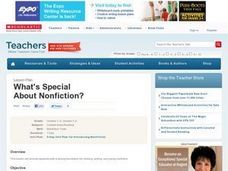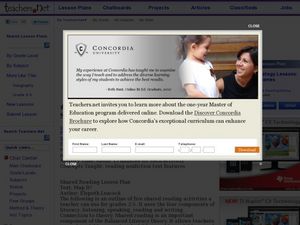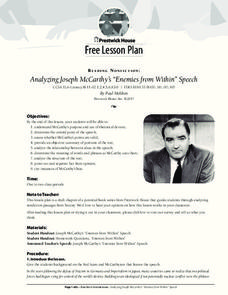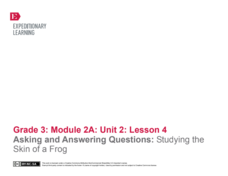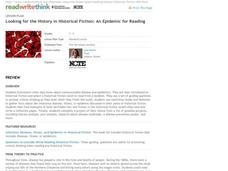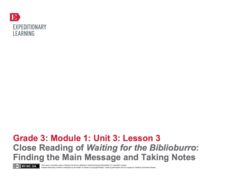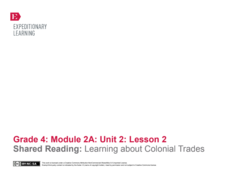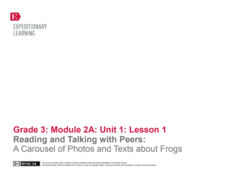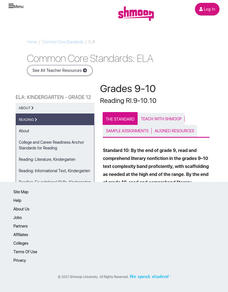Curated OER
Reading For Information
To help learners better comprehend informational texts, they work through a series of activities. They discuss strategies, make predictions, skim passages, focus on key words, and practice taking notes. This lesson focuses on what to do...
Curated OER
Reading Strategies for Decoding Tricky Words
Help primary school pupils learn valuable reading strategies. As they choral read a poster or big book, they predict covered words and learn various reading strategies for figuring out an unknown word. This will help them gain an...
Curated OER
What's Special About Nonfiction?
Students examine the difference between nonfiction and fictional writing. They identify the characteristics of nonfiction literature and examine how a nonfiction textbook organizes information.
Curated OER
Using Social Studies in Five Shared Reading Lessons: Geography
After several short 15-minute mini-lessons, your learners will gain an understanding of the characteristics of a non-fiction text. Using the book Map It by Elspeth Leacock, your class will become acquainted with non-fiction terms...
Curated OER
NonFiction Reading
Students explore reading nonfiction. In this nonfiction lesson plan, students practice using KWL charts to organize nonfiction information gained from reading. Students explore unfamiliar words from reading and recognize synonyms and...
Shmoop
ELA.CCSS.ELA-Literacy.RI.11-12.5: Structure of an Argument
Imagine a cross-curricular project that not only rewards learners for examining the textbooks used in their other classes but builds literacy skills as well! Groups compare the formats and writing style in their various textbooks. Teams...
Prestwick House
Reading Nonfiction: Analyzing Joseph McCarthy's "Enemies from Within" Speech
Looking for a lesson that teaches class members how to analyze nonfiction? Use Joseph McCarthy's famous "Enemies from Within" speech as a instructional text. Worksheet questions direct readers' attention to the many historical...
EngageNY
Asking and Answering Questions: Studying the Skin of a Frog
English language arts and science combine in a instructional activity that focuses on asking and answering questions about frog skin. Discussion, a read-aloud, and partner work lead the way towards a three-page worksheet that tests...
Curated OER
Watch the Road Signs
What makes a good speaker? Upper elementary learners practice oral fluency by working with a partner to read nonfiction books. While reading, they practice using correct tone of voice, making eye contact, and speaking clearly.
ReadWriteThink
Looking for the History in Historical Fiction: An Epidemic for Reading
Combine informational reading skills with fictional text in an innovative historical fiction lessons. After reading a fictional text related to diseases, class members read non-fictional text to gain knowledge about specific infectious...
EngageNY
Close Reading of Waiting for the Biblioburro: Finding the Main Message and Taking Notes
Expose your class to Waiting for the Biblioburro, narrative nonfiction that will act as the bridge between ficiton and informational texts to come. Class members do a close reading of the text, looking at excerpts instead of the whole...
EngageNY
Shared Reading: Learning About Colonial Trades
Trading in Colonial America is the focus of a lesson plan that boosts reading skills. As a class, scholars examine the informational text for crucial details, use their newfound knowledge to share information with their peers, and write...
Digital Writing and Research Lab's – Lesson Plans
Teaching Close Reading through Short Composition/Revision
This activity may have writers evaluate short compositions, but their subjects are quite tall: great Americans. Pupils read one another's compositions and closely examine how specific phrases and diction contribute to shaping American...
EngageNY
Reading and Talking with Peers: A Carousel of Photos and Texts about Frogs
Frogs are the theme of a lesson plan that challenges scholars to examine photographs, read informational texts, then ask and answer questions. Scholars work collaboratelively as they rotate through stations, discuss their observations,...
Curated OER
An Introduction to Nonfiction
Examine the elements of nonfiction writings in this lesson. Learners list common features of nonfiction and compare nonfiction and fiction books on the same topic. Create a Venn diagram comparing and contrasting the two genres.
Curated OER
Check it Out...Nonfiction Can Be Fun!
Organizing information gathered for a research topic can be a challenge. Read aloud notes you have collected on a topic and use suggestions offer by the class to categorize and sort this information. Partners then follow this pattern,...
Curated OER
Analyzing Nonfiction Text Elements - Editorials
Examine the text features of non-fiction. Start the lesson by reading editorial samples provided by their instructor and analyze the texts for word choice, details, and organization. An editorial example and graphic organizer are...
Media Smarts
Bias in News Sources
As young consumers of media, it is important for high schoolers to explore concepts of bias and prejudice, and how they may be present in media. After discussing ideological messages that media can contain, individuals complete a warm-up...
EngageNY
Close Reading of Bullfrog at Magnolia Circle: Main Ideas about the Bullfrog
As your class reaches the end of the book Bullfrog at Magnolia Circle, the seventh lesson in this literary unit helps third graders transition from reading narrative to expository writing. Scholars develop their note-taking skills...
Shmoop
ELA.CCSS.ELA-Literacy.RI.9-10.10
Make sure that your pupils have mastered complex literary nonfiction by the end of the year and use this resource to help get them to that point. After a brief description of the Common Core standard, a list of age-appropriate...
EngageNY
Close Reading: Paragraph 4 of “Refugee and Immigrant Children: A Comparison”
Why is reading a text closely a helpful skill? Using the 13th of 20 lessons from the Grade 8 ELA Module 1, Unit 2 series, scholars continue reading the informational text "Refugee and Immigrant Children: A Comparison." They work with...
Prestwick House
Writing Arguments in Response to Nonfiction
Emotional appeal or argument? That is the question. An informative lesson helps your class recognize the difference between a logical argument and an emotional appeal and learn how to craft an argumentative response. Writers develop a...
Curated OER
Identifying Features of Nonfiction Text
Learners explore nonfiction text. They identify the cover, title page, and table of contents of a nonfiction book. Pupils work in groups to create a chapter for a nonfiction class book about heroes.
Curated OER
Compare and Contrast Nonfiction Texts
Explore nonfiction writing by comparing and contrasting two different texts. After reading two nonfiction books, articles, or magazines, students utilize a graphic organizer to record their similarities and differences. They answer study...




